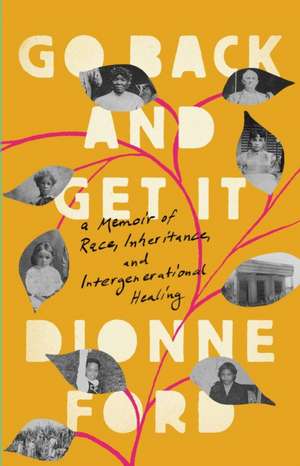Go Back and Get It
Autor Dionne Forden Limba Engleză Hardback – 4 apr 2023
What shapes does this kind of intergenerational trauma take? In these pages, which move between her inner life and deep research, Ford tells us. It manifests as alcoholism and post-traumatic stress; it finds echoes in her own experience of sexual abuse at the hands of a relative, and in the ways in which she builds her own interracial family.
To heal, Ford tries a wide range of therapies, lifestyle changes, and recovery meetings. "Anything," she writes, "to keep from going back there." But what she learns is that she needs to go back there, to return to her female ancestors, and unearth what she can about them to start to feel whole.
Preț: 116.95 lei
Preț vechi: 165.60 lei
-29% Nou
22.38€ • 23.28$ • 18.76£
Carte disponibilă
Livrare economică 20 februarie-06 martie
Specificații
ISBN-10: 164503013X
Pagini: 256
Ilustrații: 1 B/W image and 1 chart on text
Dimensiuni: 146 x 214 x 28 mm
Greutate: 0.34 kg
Editura: PublicAffairs
Notă biografică
Dionne Ford is an NEA creative writing fellow and the co-editor of the anthology Slavery's Descendants: Shared Legacies of Race and Reconciliation (Rutgers University Press). Her work has appeared in the New York Times, LitHub, More, Rumpus, and Ebony and won awards from the National Association of Black Journalists and the Newswomen's Club of New York. Other honors include grants from the Sustainable Arts Foundation and the Geraldine R. Dodge foundation and fellowships from the MacDowell Colony, Yaddo, Hedgebrook, and the Virginia Center for the Creative Arts. She has an MFA in creative writing from New York University. She lives in New Jersey.
Descriere
Countless Black Americans descended from slavery are related to the enslavers who bought and sold their ancestors. Among them is Dionne Ford, whose great grandmother was the last of six children born to a Louisiana cotton broker and the enslaved woman he received as a wedding gift.
What shapes does this kind of intergenerational trauma take? In these pages, which move between her inner life and deep research, Ford tells us. It manifests as alcoholism and post-traumatic stress; it finds echoes in her own experience of sexual abuse at the hands of a relative, and in the ways in which she builds her own interracial family.
To heal, Ford tries a wide range of therapies, lifestyle changes, and recovery meetings. "Anything," she writes, "to keep from going back there." But what she learns is that she needs to go back there, to return to her female ancestors, and unearth what she can about them to start to feel whole.
